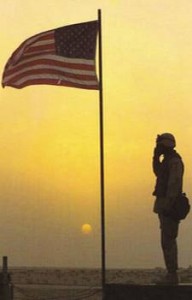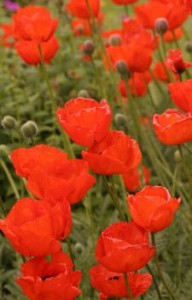- You are here:
- Home »
- Top Story »
- In observance of Memorial Day
In observance of Memorial Day
Memorial Day, originally called Decoration Day, is a day of remembrance for those who have died in our nation’s service. Some history from the website USMemorialDay.org:
“Memorial Day was officially proclaimed on 5 May 1868 by General John Logan, national commander of the Grand Army of the Republic and was first observed on 30 May 1868, when flowers were placed on the graves of Union and Confederate soldiers at Arlington National Cemetery.
There are many stories as to its actual beginnings, with over two dozen cities and towns laying claim to being the birthplace of Memorial Day. There is also evidence that organized women’s groups in the South were decorating graves before the end of the Civil War: a hymn published in 1867, “Kneel Where Our Loves are Sleeping” by Nella L. Sweet carried the dedication “To The Ladies of the South who are Decorating the Graves of the Confederate Dead”. While Waterloo N.Y. was officially declared the birthplace of Memorial Day by President Lyndon Johnson in May 1966, it’s difficult to prove conclusively the origins of the day.
It is more likely that it had many separate beginnings; each of those towns and every planned or spontaneous gathering of people to honor the war dead in the 1860’s tapped into the general human need to honor our dead, each contributed honorably to the growing movement that culminated in the official proclamation in 1868. It is not important who was the very first, what is important is that Memorial Day was established. Memorial Day is not about division. It is about reconciliation; it is about coming together to honor those who gave their all.
After World War I the holiday changed from honoring just those who died fighting in the Civil War to honoring Americans who died fighting in any war. It is now celebrated in almost every State on the last Monday in May (passed by Congress with the National Holiday Act of 1971 to ensure a three day weekend for Federal holidays).
In 1915, inspired by the poem In Flanders Fields, Moina Michael replied with her own poem:
We cherish too, the Poppy red
That grows on fields where valor led,
It seems to signal to the skies
That blood of heroes never dies.
She then conceived of an idea to wear red poppies on Memorial day in honor of those who died serving the nation during war. She was the first to wear one, and sold poppies to her friends and co-workers with the money going to benefit servicemen in need. Later a Madam Guerin from France was visiting the United States and learned of this new custom started by Ms.Michael and when she returned to France, made artificial red poppies to raise money for war orphaned children and widowed women. This tradition spread to other countries. In 1921, the Franco-American Children’s League sold poppies nationally to benefit war orphans of France and Belgium. The League disbanded a year later and Madam Guerin approached the VFW for help. Shortly before Memorial Day in 1922 the VFW became the first veterans’ organization to nationally sell poppies. Two years later their “Buddy” Poppy Program was selling artificial poppies made by disabled veterans.
Many veterans tell us that traditional observance of Memorial day has diminished over the years, that many Americans nowadays have forgotten the meaning and traditions of Memorial Day. They wish for a solemn, and even sacred, spirit back to Memorial Day is for a return to its traditional day of observance. Many feel that when Congress made the day into a three-day weekend in with the National Holiday Act of 1971, it made it all the easier for people to be distracted from the spirit and meaning of the day. As the VFW stated in its 2002 Memorial Day address: “Changing the date merely to create three-day weekends has undermined the very meaning of the day. No doubt, this has contributed greatly to the general public’s nonchalant observance of Memorial Day.”
At many cemeteries, the graves of the fallen are increasingly ignored, neglected. Most people no longer remember the proper flag etiquette for the day. While there are towns and cities that still hold Memorial Day parades, many have not held a parade in decades. Some people think the day is for honoring any and all dead, and not just those fallen in service to our country.
There are a few notable exceptions. For instance, since the late 50’s on the Thursday before Memorial Day, the 1,200 soldiers of the 3d U.S. Infantry place small American flags at each of the more than 260,000 gravestones at Arlington National Cemetery. They then patrol 24 hours a day during the weekend to ensure that each flag remains standing. In 1951, the Boy Scouts and Cub Scouts of St. Louis began placing flags on the 150,000 graves at Jefferson Barracks National Cemetery as an annual Good Turn, a practice that continues to this day. More recently, beginning in 1998, on the Saturday before the observed day for Memorial Day, the Boys Scouts and Girl Scouts place a candle at each of approximately 15,300 grave sites of soldiers buried at Fredericksburg and Spotsylvania National Military Park on Marye’s Heights. And in 2004, Washington D.C. held its first Memorial Day parade in over 60 years.
To help re-educate and remind Americans of the true meaning of Memorial Day, the “National Moment of Remembrance” resolution was passed on Dec 2000 which asks that at 3 p.m. local time, for all Americans “To voluntarily and informally observe in their own way a Moment of remembrance and respect, pausing from whatever they are doing for a moment of silence or listening to ‘Taps’.”
************************
Yes, we all face what seems to us to be a concatenation of events — an environmental disaster of epic proportions, a world-wide financial crisis still not at bay … and two protracted wars in Iraq and Afghanistan.
And while we like to bitch and moan about our mistreatment as attorneys — poor wages, disrespect, cramped quarters, and cold pizza — those issues (and, quite frankly, the entire e-discovery industry) pale in comparison with the day-to-day trials of of our returning war veterans, and those still in service.
So we hope you will join us in saluting all veterans and those in service, and remember, reflect and honor those who have given their all in service to their country.


